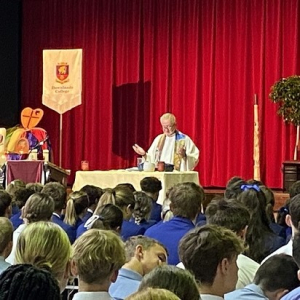Peter MALONE
Freud's Last Session
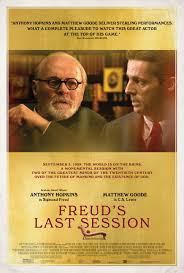
FREUD'S LAST SESSION
Ireland/UK, 2023, 109 minutes, Colour.
Anthony Hopkins, Matthew Goode, Liv Lisa Fries, Jodi Balfour, Jeremy Northam, Orla Brady, George Andrew-Clarke, Rhys Mannion, Stephen Campbell Moore, Peter Warnock, Aiden McArdle.
Directed by Matt Brown.
With Anthony Hopkins in his mid-80s and a 55 year career playing Sigmund Freud, who can resist? It seemed he never met Christian apologist and fantasy author, Oxford CS Lewis, but veteran psychologist Arnold M.Nicholi wrote a book, The Question of God, placing the arguments of each in juxtaposition, compare and contrast. In 2012, playwright Mark St Germain wrote a play, drawing on The Question of God book and some information that before his death Freud met an Oxford don (not identified).
So, with the collaboration of the playwright, here is a film version of the play. For those interested in Freud, a great deal on his perspectives on psychoanalysis and, as expected, his views on sexuality. For those interested in Lewis, a great deal on his conversion experience, his sense of the presence of God. Freud was about to die. Lewis was to have an impactful career in broadcast, writing, Christianity, the Chronicles of Narnia…
It is September 3, 1939. Hitler has invaded Poland. Chamberlain will declare war on Germany. The atmosphere in London is tense, parents and children flocking to railway stations to evacuate the children, and air raid siren and shelter, planes flying overhead. In terms of a World War II film, this is an excellent evocation, filmed with muted colour.
Freud is living in Finchley, having fled Vienna the year earlier with his daughter, Anna, herself a reputable psychoanalyst, especially for children, who lectures in London. Freud has cancer of the mouth and is in pain. His also listening to the radio, wanting to hear the news about the war. And he has agreed for CS Lewis to visit him, even though the two have opposing views.
While most of the action takes place in Freud’s office/den, the play has been opened out with great impact, dramatised flashbacks to the early life of each of the men, Freud’s life and work in Vienna, his reputation, his refuge in England. With Lewis, there is his childhood, parents, but especially the experience of the trenches, death of a friend, wounded, the siren and shelter evoking memories of trench terror. Through these flashbacks and the consequent conversations, we learn a great deal about the two men.
While the two meet, there is quite some hostility between them, Freud and his atheism, his free thinking about sexuality and pleasure, while Lewis is rather more buttoned up, eager to defend belief in God. Which means there are many interesting conversations, Freud and his quips and putdowns, Lewis more aggressive at times. In fact, what we see is an incipient psychoanalysis by Freud of Lewis, not just what he says but what he doesn’t say. And, as the two interact, there are psychoanalyst intimations about Freud himself, especially about his relationship with his daughter, Anna, and Lewis’s attack on their codependence.
For those who side with Freud, the film will confirm their beliefs. They will not be persuaded by Lewis. However, those who side with Lewis, will appreciate his sense of the presence of God, a final dream as he nods off on the train back to Oxford, a forest full of bright light, transcendent light. But Lewis does tell Freud that God is often incognito in the world.
Interesting writing, top performances, a film with substance and intelligent challenge.
- A blend of actual history and imagination? An Oxford Don visiting Freud just before his death? Identifying CS Lewis’s? Based on a book of speculation, adaptation as a successful play, the text of the play and its being opened out with flashbacks?
- Audience knowledge of and interest in Freud, psychoanalysis, his career, his theories, his work in Vienna, fleeing the Nazis, settling in London, his final illness, cared for by his daughter, the information about his death, September 23, 1939? The impact of Anthony Hopkins playing him, screen presence, dominating, articulate, delivery, humour, seriousness?
- Audience knowledge of and interest in CS Lewis? Christian apologist, his radio broadcasts, he is books, apologetics, the war and his linking with children, leading to his fantasies and fiction, especially Narnia?
- The action taking place in London, September 3, 1939? First of September, Hitler invades Poland? Tensions? Chamberlain’s declaration of war? Atmosphere in London, the muted colour for the film, the trains, parents and children, the children being evacuated? The atmosphere in the streets? The air raid siren and taking shelter? Freud listening to the radio, not wanting to hear the music and his reasons for this, wanting to hear what Chamberlain says?
- The focus on Freud, his age, cancer of the mouth and the prosthetic his need for medication relief, the routines in the house, his wife away, Anna and her care, the past psychoanalysis with her father, the suggestion of codependence, her going to the lecture, the phone call, hurrying out, knocking on the doors, the doctor, the taxi, coming to his aid? His anticipation of CS Lewis’s visit, complaining about punctuality, his quips and putdowns to Lewis, ironic?
- The flashbacks, Freud and his Catholic nanny, St Jim from the and her statue, age 6, his making the sign of the cross, his father and the Scriptures, his reaction, ousting the nanny, forbidding his son to talk of heaven? The influence on his atheism? His growing up in Vienna, his clientele, reputation around the world?
- The focus on Lewis, his age, his critique of John Bunyan’s Pilgrim’s Progress, his interest in visiting Freud, confronting him, the existence of God, psychoanalysis, his background in Oxford, his childhood, his parents, he and his brother boarding school in England at a young age, the consequences, his service in World War I, the flashbacks to life in the trenches, his best friend, entrusting care of his mother to Lewis, going over the top, the friend being killed, the shrapnel near Lewis’s heart and inoperable, time in hospital, Mrs Moore, the relationship, friend, her later being housekeeper? The scene at the pub, The Inklings, the presence of Tolkien, the scene with Tolkien – and Freud praising Tolkien’s fantasies?
- The venue, the action within the house, the main room, Freud then, desks, chairs, the many statues, duties, many cultures, Freud’s explanations?
- The discussion, the equivalent of a psychoanalysis session, Freud so, analysing Lewis, what Lewis said and what he didn’t say? And some reverse psychoanalysis of Freud himself?
- The range of the discussion, some antagonism, scoring off each other, Freud self-confident, Lewis confident but British reserve, buttoned up character, difficult to express his inner life? Discussions of God, atheism, Freud’s perspective, Lewis’s conversion and his explanation, a sense of the presence of God, his comment that God goes incognito in our world?
- The issue of sex and sexuality, Freud expressing his opinions, freedom, pleasure, the issue of homosexuality in British reserve, careful on the issue of lesbianism, his daughter?
- The focus on Ana Freud, with her father, the psychoanalysis, Lewis mentioning codependence, Freud harsh reaction? Yet Anna and her devotion, but her skills with children psychoanalysis, going to the lecture, the put down by the authorities, the phone call, out of the lecture, searching for the medicine, returning? The character of Dorothy, in psychoanalysis, in Vienna, coming to England, the relationship, Anna and her hesitance, the decision to go with Dorothy, to be with her in the presence of her father? And his final nod and smile of approval? His final image in the film?
- The contrast with Lewis, the visit of doctor Jones and his wanting to have a relationship with Ana, his being influential in persuading Freud to go to England? Lewis taking the dog for a walk, Freud’s comment about the dog being companion, indicating psychological states of the clients? Lewis then leaving, returning to Oxford, the train, falling asleep, the scenes in the past with the deer, the recurring scene, the transcendent light in the forest? The final image of Lewis?
- The impact of the film for atheists, agreeing with Freud, dismissing Lewis’s ideas? The impact of the film for those who agreed with Lewis, his expression of his beliefs? And little impact on Freud?
- The final information about Freud’s death, assisted by his doctor? And the future career of Lewis?
Inside

INSIDE
US/Belgium/Greece, 2023, 105 minutes, Colour.
Willem Dafoe, Gene Bervoets, Eliza Stuyck.
Directed by Vasilis Katsoupis.
Edgar Allan Poe had a story about the premature burial, on being buried alive and the threat of death. Ryan Reynolds starred in Buried, a drama with the same theme.
However, this is a story of an art thief, Nemo, yet another excellent performance from Willem Dafoe, who invades a lavish Manhattan apartment to steal paintings by Egon Schiele, fails to find a self-portrait and breaks the security, finding himself trapped, his contact breaking off the phone call.
So, Nemo is buried, a burial inside his deteriorating mind, and external burial and his means for survival in the apartment.
He tries every means for escape, even building a huge scaffolding with tables and furniture to try to reach the skylight and remove its bolts but this takes time and he is unsuccessful, even falling from the scaffolding and breaking his leg, having to construct a splint and limp around the apartment.
Extreme heat and cold, no food and water, water from the sprinkler from for the extensive garden within the apartment, dog food, fish from the aquarium. And his mind deteriorates. He can see on the surveillance screens the maid outside but she does not hear him, wearing earphones. And he has a dream fantasy about meeting the owner at a social.
Weeks pass, he finally lights a fire so that the extinguishers will pour water and alert outsiders – flooding the apartment but no response.
Nemo creates his own art on the walls of the apartment.
At the end, it is left to the audience whether he actually reaches the skylight and is able to escape – or not.
Screenplay was written in collaboration with the director whose only previous film was a documentary about a musician friend. The main author is British Ben Hopkins, Simon Magus, The Nine Lives of Thomas Katz.
- The title? Literally in the apartment? Nemo trapped in his deteriorating mind?
- The situation, lavish apartment, the works of art, Nemo as a thief, his contact, not finding the key painting, the search, breaking the security, his being trapped? The consequences for his survival?
- The visuals of the apartment, lavish, the rooms, staircases, skylight and windows, the artwork, and gallery? The secret passage? The secret room for the self-portrait? The background score?
- Willem Dafoe, his career, performances, skills in different characters? Age, appearance? Voice? The credibility of his situation, means for survival, consequences?
- His background story, choices in the disaster, keeping art, art being ageless? For his background as an art thief? Appreciation of art? And his own artwork, drawings, telling his story on the wall? And the note to the owner?
- The entry, the plan, security, his phone contact, not finding the self portrait, the breaking of the security, his contact breaking off contact? Stranded?
- The two dramas of his being inside, inside his mind and its deterioration, externally and his attempt at survival?
- The thermostat broken, the extreme heat and cold, finding clothes and coats? The refrigerator, the continued playing the song on opening the door, no food, no water? The huge garden, the sprinkler and the water? The trapped pigeon and its death? Building the scaffold, to reach the skylight, removing the bolts, making the tools? Eating the dog food, the fish from the aquarium?
- Time passing, the strain, no contact, the compensation of the television? Focusing, focusing on time, on food, exercise, survival? Deteriorating?
- The continued building, the bolts, his falling, breaking his leg, the splint, finding the painting, the smoke detector, the deluge of water?
- The surveillance, his being able to see so much about side, but especially the maid, his name for her, vacuuming, eating lunch, the earphones and her not hearing him bang or call? Fantasies about her?
- The dream, the social, formal, the discussions with the owner, the conversation?
- His own art, drawing, sketching, the wall, the final note?
- The end, the opening of the skylight – and whether Nemo escapes or not?
Anzac Day, tribute to Norbert (Nobby) Earl MSC, Kokoda Track.
Anzac Day, tribute to Norbert (Nobby) Earl MSC, Kokoda Track.

MSC memories for Anzac Day concern the many men who served in the armed forces in war, in peace time, and the many chaplains.

Recommended is Jim Littleton’s revised book on the Armed Forces, many names, many stories.

With the Prime Minister, Anthony Albanese, and the PMG, James Marape, walking two days of the Kokoda Track this week,

there were many reports in the media. In an article in The Age and The Sydney Morning Herald, Peter Fitzsimmons included four stories from his book on the Kokoda campaign. Here is his marvellous story about crossfire, a pause of a funeral, the crossfire – and Nobby Earl (Six or seven years ordained and in his early 30s).

And a fine tribute:
“Father, Nobby to us heretics, and whom he liked to be called by us who were not of his faith; never have I met a man who has made such an impression on me by his absolute, simple faith; and if I was asked to say what my definition of a thoroughly happy man was I would say Nobby Earl. He owned nothing and yet he owned the world. P.76. Major M.I.Bidstrup, interview 14 January 1986.

Shane Carr MSC, Chaplain, Downlands College
Shane Carr MSC, Chaplain, Downlands College

Shane was appointed this year to Downlands College as Chaplain.

And Lenten classes (photos from the College Facebook page)



And learning early about Jesus washing feet – and doing the same.

Casablanca Beats
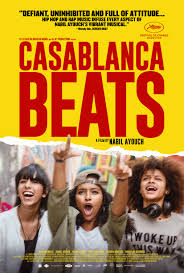
CASABLANCA BEATS
Morocco, 2021, 101 minutes, Colour.
Anas Basbousi, Ismail Adouab.
Directed by Nabil Ayouch.
Nabil Ayouch (Mekteb, Horses of God) is alerted Moroccan writer-director. He has been writing and directing since the 1990s, helping to contribute to the reputation of Moroccan cinema. And, with the screenplay, he has worked with Marianne Touzani, emerging writer and director (Adam, The Blue Caftan).
This is a story set in a poorer area of Casablanca, a focus on families, but especially a focus on the young, going to school, and for education in music. There is a mixture of young men and women, some of the women play, others not, on headscarves, some not, indication of Muslim freedom in Morocco.
The film focuses on a musician in his 20s, his past reputation, coming to instruct the young people.
For a younger audience, there will be identification with the characters, their backgrounds, their ambitions, their talents, the liveliness, the response to music. But, the main focus of the music in this film is Rap, acknowledgement of the American influences, and a range of sequences where the young people are urged to create their own Rap (and the subtitles translating and parallels with the familiar modes of American Rap). The instructor is very critical of some of the attempts to the surprise of the students. However, they continue to respond well, working hard on their presentations.
A great deal of the central part of the film is the presentation by each of the students, each with the different personalities, bravado, reticence, collaboration, sparring off each other… And some scenes of disapproval from parents and families.
For audiences outside of Morocco, it is an interesting opportunity to learn something about life in Casablanca in the 21st-century, the Muslim traditions but also the opening to the outside world, especially through music and Rap.
For audiences in Morocco, younger audiences, some enthusiasm for developing a more open 21st-century mentality and behaviour.
Sweet East, The
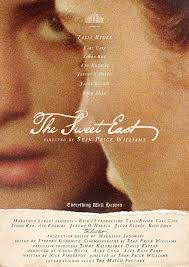
THE SWEET EAST
US, 2023, 104 minutes, Colour.
Talia Ryder, Earl Cave, Simon Rex, Ayo Edebiri, Jeremy O.Harris, Jacob Elordi, Rish Shah.
Directed by Sean Price Williams.
The title. East refers to the US states from New York north to Vermont. Sweet? Not really – rather, ironically.
This film has been advertised as a picaresque journey. Checking again on the meaning of “picaresque”, the adjective is quite accurate: suggesting, or being a type of fiction dealing with the episodic adventures of a usually roguish, but appealing, protagonist of a low social class.
And who’s picaresque journey? It is Lillian, a high school student from South Carolina, arriving in Washington DC with a group of school friends on tour – something of an exuberant lot, cameras at the ready.
And the audience for this film? Not a mainstream audience because Sweet East is sending up mainstream films. It is small budget. It is independent movie-making. The director, Sean Price Spencer, has been cinematographer for some admired independent films like Uncut Gems. And the writer, huge emphasis on words, vocabulary, articulation, popular rhetoric, is a long time film critic, Nick Pinkerton. Which means that Sweet East is a film for themselves and their friends and admirers. And for those who want something a little different.
We are introduced to Lillian, singing, looking at herself in the mirror, joining up with her friends at the beginning of the picaresque. What is on this picaresque menu? And how seriously should we take it all? Lots of the bizarre, sometimes absurd, funny, depending on your sense of humour.
First there is a sendup of deranged customer with a gun in the pizza parlour, hiding in the toilet. Then her rescue by some rather preppie protesters, banners and causes, going to the wrong venue for their protest. Lillian gets away, finds herself in a more serious protest, right-wingers, and being rescued by professorial neo-Nazi. She calls herself Annabel which is a cue for his enthusiasm about Edgar Allan Poe. She can be sexually provocative. He is ideological, conversation as a lecture. But, she exploits him, accommodation, food, clothes, trip to New York – and stealing his bag full of money.
At this stage, we are wondering where Lillian/Annabel is going when she is sighted, scouted by two African-American filmmakers, so with the gift of the more-than-gab, chatter about moviemaking, references to Merchant Ivory films, infatuated with this young girl, photographing her, rehearsing her, making her the star of the period film, co-starring with the British self-infatuated actor, Jacob Elordi. But, there is a nice cameraman who is protective of her.
Then a huge change of mood, perhaps indulgence by the filmmakers, gangsters looking for Annabel for the money, and an enormous mishmash of violence which could be the envy of horror filmmakers with a love of gore! Deaths all round. But, a rescue by the nice cameraman, and his remote community with Muslim prayer practices.
Where can it all end? Well, of course, Annabel becoming Lillian again, going home to family, the actual ordinary life, experiencing the mayhem. Is this the kind of scenario which influenced Alex Garland to make Civil War?
Truth vs Alex Jones, The
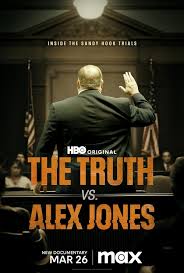
THE TRUTH vs ALEX JONES
US, 2024, 120 minutes, Colour.
Directed by Dan Reed.
This is a highly significant documentary, especially in its year of release, 2024, the campaign year for the US presidential election and Donald Trump, with his history, as the Republican nominee.
Directed Dan Reed, British-born, prolific documentary producer and director, has quite a list of documentaries on contemporary issues, served as photographer for this film, sponsored by HBO, with access to court proceedings as well as documentary footage from television programs.
Audiences may remember the shooter who killed small children and teachers at the Connecticut school at Sandy Hook, 2012. It shocked America and had repercussions around the world, the deaths of small, innocent children. However, well-known conspiracy theorist, Alex Jones, who had his widely-viewed television program, Infowars, very quickly announced that the episode was a hoax, the parents and others involved were just actors, moved by the government to orchestrate an episode to gun laws.
The film introduces Alex Jones early, quickly tracing his career, footage from various programs, seeing him age, hearing his emotional outbursts, his attacks against globalism, and his manufacture of various products promoting health and his advertising of these – and successful sales the more sensational his “news” items and the increasing of his viewing audience. In the contacts, his wild accusations against the parents, promotion of the hoax, seem extraordinarily callous.
The documentary also introduces the background to the children, their parents, going to school that fatal day, the outline of the events which happened, the shooter, the automatic, the children huddling in the toilet block, teachers and staff shielding them and dying, the death of the principal and the assistant…
This film is also able to show the interviews of the parents at the time of their shock, finding their children, going to the school, holding their children… And, there are interviews with the parents over the succeeding 10 years. There are also interviews with the main lawyers who took up their cause.
Over a period of 10 years after the events at Sandy Hook, several of the parents took Alex Jones to court. One of the things that Jones exploited was one of the parents, harassed by the media, deciding to go and give a statement on television, nervously smiling, then becoming very serious – Jones exploiting this nervousness as an actor being able to change his emotions on cue. The repeated play of this scene and its effect on the father is harrowing.
The latter part of the film is absorbing, the camera in the courtroom, first in Texas, the two parents, interviews with them, close-ups, their going into the stand, the techniques of the lawyer for them, the techniques of the lawyer for Jones (and out-of-court interviews with him explaining his stances), an interview with a young jock who had exploited the situation on his television program, the impressive presence of the judge and Jones’s attack on television on her.
The issue of the court was not that Jones had to be proven guilty for his broadcasts, that had been established, his having made apologies, yet going back to the same themes on his programs. Rather, there was the issue of allotment of money for the parents. This is then repeated in a Connecticut court with a large number of parents. Also in the film is Jones’s 2019 Deposition, a revelation of his character, his playing with the truth, his ambitions, sales, audiences.
Since 2016 and the presidential campaign of that year, there has been a greater focus in the US on a range of conspiracy theories, racist, complications with African-American deaths in Black Lives Matter, with theories about Hillary Clinton and child exploitation, the Alt- Right, the election of Donald Trump, his four years, is 2020 defeat, the capital demonstrations on January 6, 2021, his refusal to accept the election results, his fostering this in succeeding years and several court cases.
It is shocking to hear the parents talk about the attacks on then, random people confronting the men the streets and labelling them as actors and liars, social media postings, threats… And the amazing statistic that is produced that 24% of Americans (in fact 75 million people) still believe that the events at Sandy Hook were a hoax.
Well worth seeing, a significant contemporary challenge.
Challengers

CHALLENGERS
US, 2023, 131 minutes, Colour.
Zendaya, Mike Faist, Josh O'Connor.
Directed by Luca Guadagnino.
Anyone for tennis? The title comes from a tournament in New Rochelle, the Challengers. And we are introduced to an intense match between two men, clearly rivals.
Quickly the narrative goes back two weeks, the explanations of the characters, then the film goes back 13 years, with many time shifts, sometimes flashbacks within flashbacks, for the audience something like watching a match, continually switching from looking at one end to the other. Sometimes this requires quite an effort. And, some of the photography and editing of the actual tennis play, swift and sharp, sometimes in slow motion, especially at the end, is not always effective for movie concentration.
While the focus is on tennis, at the centre is a triangle relationship. Because the film opens in 2019, we see the three protagonists in some kind of conflict, two men facing off each other in the finals of the tournament, the woman, Tasha, who has been at the centre of their lives for many years, sitting in the stands, watching intently. When the narrative goes back in time, we are very aware that matters have not turned out so well over the period of 13 years, heightening the drama of our watching the characters, their meeting, two men in love with the same woman, her choices, changes, tennis rivalries…
This is very much a film for younger audiences, that is, audiences in their 20s, especially. We see the characters at 18, follow their progress till the end of the film when they are in their early 30s.
One of the difficulties is that the three characters are not all that interesting in themselves. Nor are they particularly likeable, it is somewhat difficult to have a care for them in their conflicts. In fact, the performances are very effective, showing the complexities and ambiguities of the characters. Zendaya is the young woman at the centre, tennis champion, strong-minded, very determined. It is different with the two men. Josh O’Connor plays Patrick, easy-going in many ways, not as good as tennis as he might hope, wanting to be liked, more than a touch self-absorbed, and developing into something of a cad. The other man is Art, Mike Faist, more talented at tennis, friends with Patrick since they were boys. They have been successful in doubles, but both are smitten when they see Tasha and make a bid for her attentions.
The musical score is often techno beat, intense beats, sometimes obscuring the dialogue.
The film is rather long, we spend quite a time with each of the men, with Tasha, and the ups and downs of the relationships, and, depending on how interesting we find the characters, this will determine whether audiences would really enjoy Challengers or not.
- The title? The tennis theme? The triangle relationship theme? Interactions?
- The work of the director, his Italian background, themes, relationships, sexuality?
- The American settings, New Rochelle, Atlanta…? The tennis courts, clubs, audiences, apartments and hotels, cities streets, tennis atmosphere? The musical score, the techno score and its insistence?
- Opening in 2019, moving to 2 weeks earlier, moving 13 years earlier, the trio in the past and their encounters, relationship, through the years, back to the present and the final set? The audience looking at the change of times like tennis viewers, and is moving from one side to the other?
- The dramatic impact of showing the present, the competitiveness, determination, back to the past, the trio when young, tennis abilities, the men winning the doubles, Tasha and her skills, aged 18, amateurs, discussion of turning professional? The effect on the later sequences by knowing what the crisis was at the beginning and end of the film?
- Patrick and Art, friendship from boyhood, discussions about the relationship and friendship, sexual behaviour at 12, the bonding, playing together? The gradual revelation of Patrick and his personal intensity, self-absorbed? The contrast with Art, his abilities, quieter personality?
- The introduction to Tasha, age, tennis skills, determination, the final scream when winning, the media? The party, the two men approaching, conversation, her interest, the invitation, in the room, her turning up, the discussions, tantalising each of them, manipulating them to kiss each other? Her leaving?
- Their careers over the years? Art and greater success? Patrick less success? Their drifting apart? Tasha and her skills? Winning, the significance of her fall and accident, emotions, treatment, Art supporting her, her recovery, determination to go on? A very determined personality? Playing the two men?
- Patrick and his career, some victories, the years passing, down and out, Is Arriving in New Rochelle, his charm on the hotel manager and failing, sleeping in his car, trying to get the prize money? The matches in the tournament, the final and the three sets against Art?
- Art and his story, his relationship with Tasha, relationship with Patrick, Art and his support, success, marriage, their daughter, his mother caring for the daughter? The confrontation with Patrick?
- The three sets intercut throughout the film? Tightening the drama? One all, the final question
- the focus on the games, the tennis player, sequences, point of view of each character, the audience, the umpire, decisions about in and out, the school, the past tournaments, practice sequences, the place of the camera, editing and action?
- Patrick and his contacting Tasha, the phone number, his asking her to coach him, her violent reaction, keeping the note, returning to the hotel, the challenge as to whether she loved Art or not, going out, the encounter with Patrick, sexual, anger with him, getting out of the car, returning, Art with their daughter?
- Tasha asking Patrick to lose the set, his reactions, agreement, visual techniques for the final games, slow motion, pausing, Tasha and her intensity, final set points, each looking at the other, their decisions, the final play, long, and the ending with Patrick leaping the net and embracing Art? The future for each of them?
Fortunata
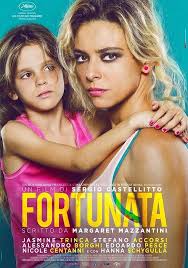
FORTUNATA
Italy, 2017, 103 minutes, Colour.
Jasmine Trinca, Stefano Accorsi, Alessandro Borghi, Eduardo Pesce, Nicole Centanni, Hanna Schygulla.
Directed by Sergio Castellitto.
Fortunata is the dramatising of the life of a very emotional woman, a hard background, harsh memories of the death of her father and responsibilities, marriage to a violent man, divorce proceedings, bonding with her daughter but their being tensions, the experience of work with the therapist…
The film has been written by Margarita Mazantini who collaborated with her actor-director husband, Sergio Castillitto. They worked on several films together.
The film was nominated for many awards and actress, Jasmine Trinka, winning several for Best Actress. Her character is highly emotional and the performance dramatises the emotions, sometimes there are extremes. In support is StefanoAccorsi as a sympathetic therapist, Alessandro Borghi as a friend who is bipolar, Eduardo Pesce as her brutal husband, and German actress, memories of her work with Fassbender, Hanna chuygulla as a former actress with dementia.
The treatment is highly emotional, dramatic and melodramatic, but the central performance is certainly commanding and audiences can be swept up into the domestic drama, the behaviour of the brutal husband, menacing and violent, the possible escape with the therapist, at the core relationship of mother and daughter.
- Title, the irony of Fortunata and her name? The background, Her father, a failed marriage relationship with her daughter, therapist, ambitions, her emotions, careful Chicano? Custody issues?
- The Italian city, apartments, addresses, therapy offices, the aqueduct, countryside, the visits to Genoa? The musical score?
- Fortunata’s story, her age, the sequences with her husband, violent brutality, verbal violence and menace, physical violence? The divorce? Her relationship with Barbara, Barbara’s moods, school, dropping the bag, the exasperated mother? Barbara possessive? Fortunata and hair-dressers, the plans, with Chicano, with her friends? The work and preparations? Going to the therapist, observing Barbara? The bond with Patrizio, the outing with him, the travel, his story, the dancing, the sexual experience, the consequences of the relationship? Her husband, the accusations, Chicano and the death of his mother, meeting with the judge, the husband and the filming of his wife and her behaviour? Her losing her daughter?
- Barbara, her age, relationship with her mother, aggressive, yet dependent, going to the therapist, bonding with him, her drawings, the discussions, his drawing her out of herself? The suspicions of her mother with the therapist? Angry at her mother going away, going to the roof, hurting herself? Her father’s reaction? Going off with him? Finally alienation from her father, bonding again with her mother?
- Chicano, bipolar, drugs, looking after his mother, gentlemen, the past as an actress, quoting Antigone, his devotion to Fortunata, working with her, the encounter with the Patrizio, his plann for the withdrawal from drugs? The birthday party for his mother, blowing out the candles, her behaviour, her dementia? The walk with her, the memories,his exasperation at her not recognising him, the bridge, accusing him, his memories of the story of Fortunata letting her her father drown, the death of his mother – and the later finding of her body?
- Patrizio, therapist, the background in Africa, his reputation, his charm, with Fortunata, with Barbara, friendship, smiling, encouraging, the questions, drawing her out of herself, her bonding with hearing? The attraction to Fortunata, the outing with her, taking her to his town, night, the dancing, the room, sex, the return, the crisis on the return, Fortunata and his reaction to her, his trying to help? The final talk between them and her reaction?
- The culmination, the dramatising of her father’s death, her denial, visualising the water, a verbal description, her father in the water, going out to sea? The issue of blame, a highly emotional reaction to Chicano, wanting to see him, hysterics, her final catharsis with the memories of her father, joining again with Barbara at having a future?
Chimera, La
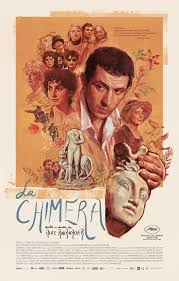
LA CHIMERA
Italy, 2023, 130 minutes, Colour.
Josh O’Connor, Carol Duarte, Isabella Rossellini, Alba Rohrwacher, Lou Roy-Lecollinet
Directed by Alice Rohrwacher.
Response to La Chimera may very much depend on mood and frame of mind as we choose to watch it.
The film has had some glowing reviews and Festival awards, with words like “poetic”, “magical”, being used to praise it. So, for the poetic frame of mind, no worries. But for audiences who might subscribe to a more prosaic, realistic frame of mind, perhaps not.
We are in Italy, a remote part of Tuscany, industrial, docks, poorer, dilapidated abandoned railway station, makeshift huts on mountainsides. There is a town, the streets, the cafe, but hard times.
The film was written by Alice Rohrwacher, a director with a strong reputation (Happy as Lazzaro). The star is the British actor, Josh O’Connor (Prince Charles in The Crown, Challengers), and a cast of Italian actors with an enjoyable cameo by Isabella Rossellini as a retired singer, demanding matriarch.
In the plot, while the setting is remote, the source of income is much more remote. It is treasure from buried in Etruscan tombs, with the locals digging them up, fixing and mending, and negotiating with an unseen dealer who markets them to wealthy international collectors.
So what is an Englishman doing in this setting? He is an archaeologist with a gift for divining the buried relics (using a forked branch). But he has lost his love, longing for her, dreams of her, and is returning to the town after serving a prison sentence.
He is taciturn, sombre, going to visit the singer but trying to avoid his ragtag band of past collaborators. But he does go back to divining, is attracted to the singer’s maid – and loosens up a little, but generally, a morose hangdog look.
.
There is background drama with the town’s characters, some comic touches (action speeded up at one stage in the character giving her opinion straight to camera). The critics have praised the evocative cinematography, the poetic aspects. And then there is a cameo from veteran actress Alba Rohrwacher (the director’s older sister) in an unexpected character.
There is some excitement towards the end with a significant discovery of a shrine in statue of goddess – and criminal shenanigans and small wheeler- deals.
An unexpected and offbeat drama.
- The title? The visual images and cards?
- The Italian setting, Tuscany, the remote town, the docks, the streets, the cafe, the abandoned railway station, ramshackle homes, makeshift huts on the mountains? The contrast with the city, the buildings, business dealings, the yacht on the lake, the option? The musical score, the range of songs and their lyrics illustrating the themes?
- Critical acclaim, poetic and magical? Festivals and awards? For the poetic imagination? Not for the realist imagination?
- The introduction to Arthur, in the train, with the young women, his comments, flirting, the salesman and his attack, comment on his smell? The white suit? The dream, his lost love? The mystery of an Englishman in Italy? The mysterious, poetic, dream sequences throughout the film, and the reprise of this same journey and characters later in the film?
- His arrival in the town, his friends meeting him, his not wanting to join them, is going to Flora’s house, the discussions with her, the lost love and the memories, the symbolism of her face, the son following them, the red thread on the ground and the later snapping of the thread after he sees it in the cave?
- His going to his makeshift huts, trying to settle back, meeting up with the friends, their work, personalities, the preparation for the Festival, the masks, the town and rejoicing?
- Arthur, his background, archaeology, his knowledge, the forked branch, trees upturned, the maid seeing them, pulling them out, the signals for the buried relics? upset? But his returning to the divining, finding the tombs, the contents, in the town, the group mending and fixing, the contact with Spartaco, Arthur indebted to Spartaco, going into the city and the office, the financial deals, not seeing Spartaco, meeting with her niece?
- The character of Italia, her background, her two children, the daughter older, the sleeping boy, concealing them? Wanting to sing? Serving as a maid to Flora? Flora and her household, the various women, their arguments? The visit to the railway station, her leg, the wheelchair? The railway station abandoned?
- Arthur, the attraction to Italia, going out with her, the Festival, the dancing, on the shore, the the sand above the hidden tombs, the discovery of the grave, her threatening the police,?
- Arthur and the discovery, in the tunnel, the shrine, the statue, the gifts? To get them out, breaking off the head? The seeming police? Spartaco’s henchmen disguised as police? Their getting the statue, packing it, transferring it to the yacht?
- Italia, the children, setting up a centre for them in the abandoned station, redecorating it? Her collaborators?
- The information about the yacht, Spartaco and her niece and explanations, the scenes of the auction, the wealthy clientele, Spartaco as a woman, her dress and style? The group coming to the auction, the intrusion, trying to bargain with Arthur, his mood, exasperation, throwing the head into the sea, the scene of drowning at the bottom of the sea?
- The consequences for the group? The consequences for Arthur? The presence of the police throughout but their not being able to convict?
- Arthur, his wanderings, finding the new cave, exploring, the thread and memories of his love?

